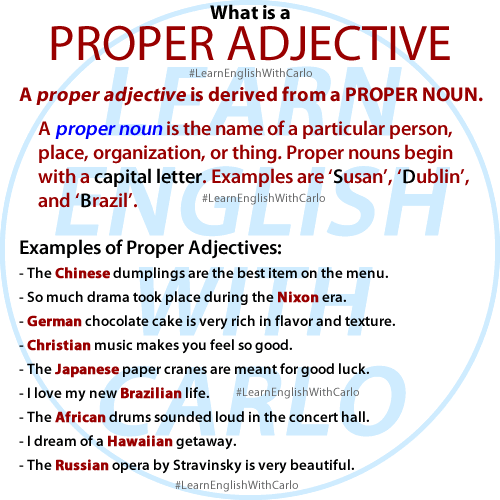In English, proper adjectives are derived from proper nouns, which name specific people, places, organizations, or things. What makes proper adjectives unique is that they always begin with a capital letter, just like the proper nouns they come from. These adjectives allow us to describe things with precision, linking the characteristics of a person, country, or culture to the noun being modified.

What is a Proper Noun?
A proper noun is the specific name of a person, place, or thing. It distinguishes one person, place, or thing from others in the same category. Proper nouns are always capitalized, regardless of where they appear in a sentence. Some examples include:
- Susan (a person’s name)
- Dublin (a city)
- Brazil (a country)
- Apple (a company)
Now, when we take these proper nouns and turn them into adjectives, we create proper adjectives.
What is a Proper Adjective?
A proper adjective is formed from a proper noun and is used to describe something by linking it to the noun it originates from. Proper adjectives must also be capitalized. Let’s look at some examples:
- The CHINESE dumplings are the best item on the menu.
- Here, Chinese is a proper adjective derived from the proper noun China.
- So much drama took place during the NIXON era.
- The proper adjective Nixon refers to the U.S. President Richard Nixon, giving the era a specific historical reference.
- GERMAN chocolate cake is very rich in flavor and texture.
- German comes from Germany, connecting the cake to its origin or style.
- CHRISTIAN music makes you feel so good.
- Christian is derived from the religion Christianity, describing a particular style of music.
- The JAPANESE paper cranes are meant for good luck.
- Japanese relates to the country Japan, referencing the cultural significance of paper cranes in Japan.
- I love my new BRAZILIAN life.
- Brazilian is a proper adjective based on Brazil, highlighting a lifestyle connected to the country.
- The AFRICAN drums sounded loud in the concert hall.
- African comes from Africa and refers to a style of drums typical in that region.
- I dream of a HAWAIIAN getaway.
- Hawaiian is derived from Hawaii, implying a vacation destination connected to the islands.
- The RUSSIAN opera by Stravinsky is very beautiful.
- Russian refers to Russia, indicating the origin of the opera.
Why Use Proper Adjectives?
Proper adjectives add specificity and cultural or geographical context to what you’re describing. Instead of saying “a type of dumplings,” you can specify Chinese dumplings, bringing in associations with a particular cuisine. It gives the sentence more flavor and helps the reader visualize or understand what you’re referring to.
Common Proper Adjectives in Use
Proper adjectives are commonly used in everyday language without us realizing it. Here are a few more examples:
- Mexican cuisine is full of rich flavors.
- She loves watching French films.
- The Victorian era was a time of great change.
- My favorite holiday is Italian Christmas.
In each of these examples, the proper adjective provides clarity and context, whether about food, movies, or historical periods.
Tips for Using Proper Adjectives
- Always capitalize proper adjectives, just like you would with proper nouns.
- Don’t overuse proper adjectives in writing; they should add specific context but not overwhelm the sentence.
- Check the correct form of the proper adjective as some can have slightly irregular formations. For instance, France becomes French, not Francian.
By understanding and correctly using proper adjectives, you can enrich your writing and speak with greater precision.
